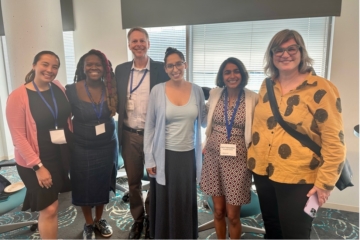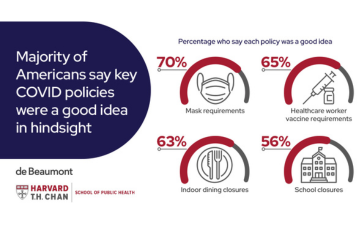
The 2022 Supreme Court decision overturning Roe v. Wade has intensified the challenges for Black women, with far-reaching impacts. This decision heightens barriers for women seeking abortions who have limited access to health care and fewer financial and transportation resources. Essential services such as prenatal and postnatal care and contraception have also been compromised, once again leaving Black women within a system not built for them. Community engagement is essential in addressing these disparities and improving Black maternal health outcomes.
What is community engagement?
Although there is no commonly agreed-upon definition for community engagement, de Beaumont’s Adapting and Aligning Public Health Strategic Skills report defines it as “an authentic, mutually beneficial, and collaborative process of working to address issues that affect the health and well-being of particular communities, which often involves prioritizing health equity.” Community engagement is a collaborative effort to acknowledge people’s needs through intentional interactions that foster mutual decision-making to yield effective solutions. The editor of Strategic Skills for Public Health Practice: Community Engagement, Emily Yu, MBA, describes community engagement as “a marriage of voices of power and ideas.” In this relationship, “the organization, the team, the individual, and whoever’s associated with this program or effort really has a mindset that centers and prioritizes community voice and community power.”
Fostering community engagement for improved Black maternal health outcomes
Community engagement is not just talking the talk but walking the walk — the same community we want to seek change in should be the voice of who and what we advocate for. Given the high rates of maternal mortality among Black women, prioritizing their needs and partnering with Black women to generate solutions can give public health professionals and organizations with insights to identify and implement necessary improvements.
“Integrating community voices in decision-making is crucial for improving Black maternal health outcomes,” says Misha Hill, MPP, the partnerships and advocacy manager at Mamatoto Village in Washington, D.C., a nonprofit organization serves Black women through career pathways in maternal health and perinatal support services. This process shifts an individual approach to a “collaborative approach, involving Black women and their communities,” which “ensures solutions match real needs,” Hill says. “Embracing community engagement as a core principle is vital for public health professionals addressing health inequities.”
Black women’s experiences should inform maternal health policies, with community engagement principles as a cornerstone. Several facets of community engagement are especially important for supporting Black women and their maternal health.
Community-centered mindset: A community-centered mindset requires a thorough understanding of the community that public health professionals are trying to reach. Yu emphasizes the importance of “understanding that there is value in what the community holds in terms of their voice, their history, their culture, and lived experience” to determine the collective needs of the community. Meanwhile, many of the challenges that Mamatoto Village staff have seen Black women face are related to social needs such as housing. Hill explains that a care team will address the social needs that Black women are lacking, such as helping them find stable housing.
Ongoing interaction: “One of the most important factors to ensure effective community engagement is follow-up,” Hill says. This process “must take place before, during, and after an intervention is implemented to ensure that it’s achieving the desired outcome.” Ongoing interaction helps to address concerns that may become too big and can also increase trust in local organizations, improving communication and understanding of the community. Hill notes that Mamatoto Village staff regularly gather feedback from participants in interventions and assess outcomes. Further, “Hearing from clients impacts how we deliver program interventions and the advocacy priorities we raise to broader coalitions and policymakers,” she says.
Meaningful collaboration: To understand the needs of Black women, public health organizations and other community members must work together. In taking on challenges such as improving Black maternal health, “finding the right balance in terms of collaboration” is essential, because “no one entity is going to be able to tackle that on their own,” Yu says. Another key takeaway for public health professionals engaging with communities: “The distinction between those working in public health and those living in impacted communities is rather arbitrary,” says Hill, underscoring that we are interconnected, and that meaningful collaboration is essential. Mamatoto Village, for example, equips Black women with tools and services for their journeys as mothers while fostering informed self-advocacy. Perinatal community health workers, who engage with Black women at home, help to empower them in shaping their own birthing experience. This collaborative approach provides tailored, evidence-based health education on pregnancy and birth, amplifying Black women’s participation and involvement.
On the path to equitable health care for pregnant Black women, integrating community engagement strategies in policies addressing Black maternal health is more important than ever. As public health professionals, the power of just listening, interacting, and collaborating cannot be overlooked — taking us one step closer to closing the gap of disparities that affect Black women. As Hill says, “In the same way that providers must actively listen to patients’ individual needs, public health advocates must listen to and respond to the community’s needs.”




